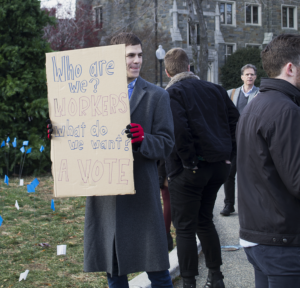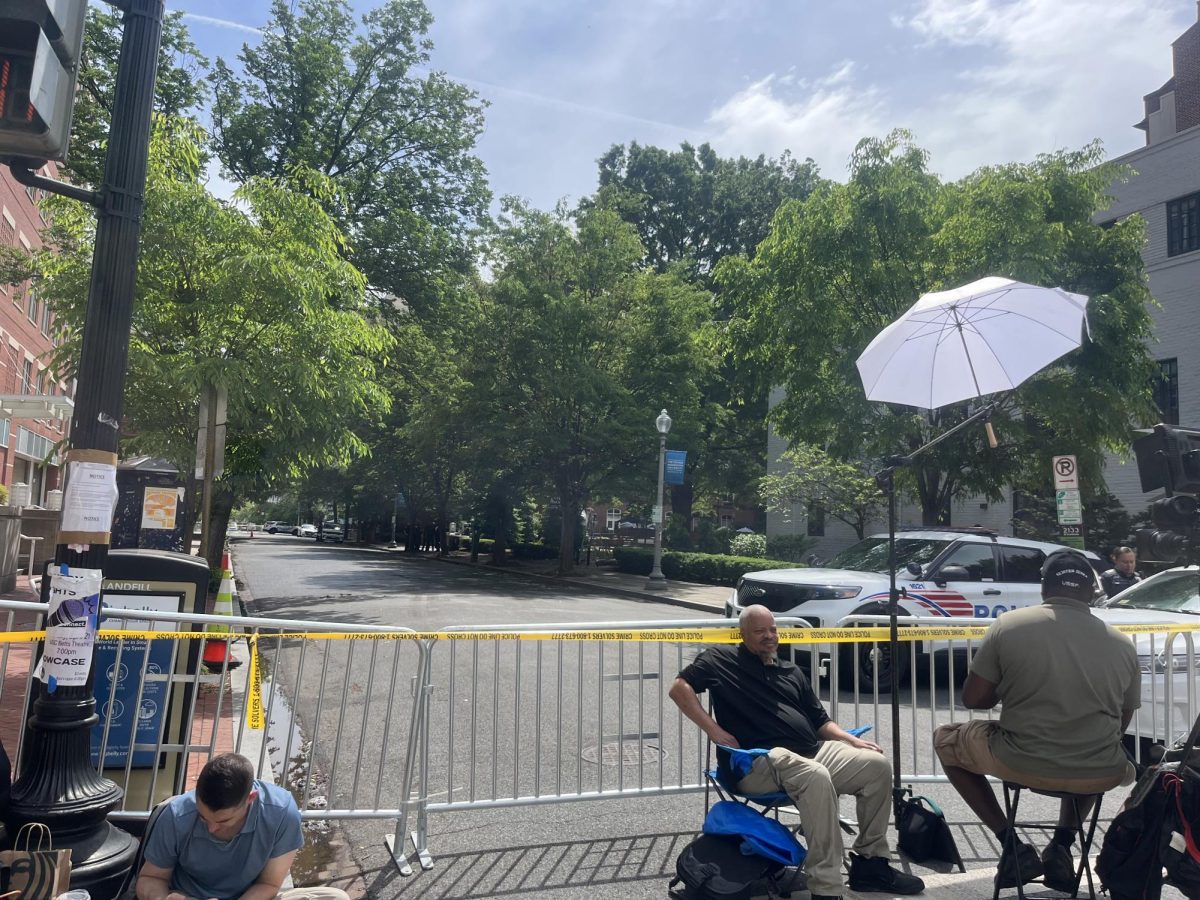Graduate student workers in the Georgetown University Graduate School of Arts and Sciences are celebrating an agreement with the administration regarding a graduate student union election next semester.
The agreement comes after a two-yearlong effort by the Georgetown Alliance of Graduate Employees for university recognition of a graduate teaching assistant labor union. The election would ask graduate student workers whether they support the creation of a union.
Provost Robert Groves and Executive President for Health Sciences Edward Healton announced the new agreement between the university and GAGE in a campuswide email April 2.
GAGE, which is associated with the American Federation of Teachers, had been in negotiations with the administration about the prospect of an election throughout the semester.
In a meeting with GAGE on Feb. 1, Georgetown’s administration verbally expressed its desire to negotiate a private election agreement that would have a neutral third-party organization oversee the election, rather than the National Labor Relations Board, which typically handles these elections. The email announcement this week marks the formal commitment to this agreement.
Sarah Gilkes, a second-year student pursing a master’s degree in the Security Studies program, said the agreement marks a historic win for graduate student workers everywhere.
“As a graduate worker, I’m excited about continuing to build GAGE’s support among all segments of the Georgetown community and negotiating a meaningful contract ensuring just labor rights for myself and my peers,” Gilkes said.

The election, in which any graduate students of the Graduate School of Arts and Sciences who also hold service titles can vote, will determine whether GAGE can act as a collective bargaining representative. If a majority of students vote in favor, GAGE will be able to negotiate on behalf of all those eligible to vote, regardless of how or whether they voted.
AFT President Randi Weingarten said that the AFT plans to continue to support GAGE throughout the election and bargaining process.
“This blueprint for voice is due to a relentless two-year organizing effort by the Georgetown graduate workers, who understood unions make possible what would be impossible for individuals acting alone. Their tenacity exemplifies what can be achieved when people unite for a say over the work they do,” Weingarten said in a statement released by AFT. “I am so proud of them, and it goes without saying we will support them in every way during the election, bargaining and beyond.”
While the NLRB typically oversees such proceedings, the election is instead being held and overseen by the American Arbitration Association, a neutral third party proposed by GAGE during negotiations and approved by the university.
An independent government agency, the NLRB has issued varied rulings over the past four decades on whether graduate students in certain teaching and research positions at private universities are eligible for unionization. The NLRB ruled in 2016 that graduate assistants are employees.
Chad Frazier, a sixth-year doctoral student and a member of the GAGE Election Negotiation Committee, said GAGE was largely motivated by the current political situation in the United States.
“We decided to propose a union election with the AAA rather than the National Labor Relations Board,” Frazier said. “We were worried that President [Donald] Trump’s appointees to the Board would overturn the August 2016 decision allowing graduate workers at private universities to unionize.”
Frazier also said that because the election process typically takes 30 to 40 days, it will not take place before the end of the spring semester.
“We indicated early in our negotiations with Georgetown that we wanted to hold a union election this semester,” Frazier said. “Unfortunately, because it took the administration longer than we would have liked to come to an agreement with GAGE, there just isn’t time for a union election before the end of this semester.”
Following the verbal agreement with the university in February, GAGE held multiple events aimed at drawing attention to the university’s lack of a written agreement. The group partnered with local artist and activist Adrian Parsons in a Red Square demonstration March 26, projecting phrases from Georgetown’s Just Employment Policy onto the walls of the Intercultural Center.
In December 2017, seven of the 11 committee members of Georgetown’s Advisory Committee on Business Practices resigned after unanimously passing a resolution urging the university to recognize the rights of graduate students to unionize, during a meeting with the Provost and other senior administrators. This came after the university announced it would not recognize a union of graduate students because it did not consider them employees.
Frazier said the agreement does not mark the end of GAGE’s work or activism.
“We want a big turnout for the election to place us in the possible position for bargaining,” Frazier said. “Our members have been consistently willing to show up and ensure that Georgetown lives up to its values as a Catholic and Jesuit university because we have taken the time to talk with them one-on-one about their experiences as graduate workers.”
The Georgetown Solidarity Committee, an undergraduate organization that advocates for the rights of workers at Georgetown, has also supported GAGE’s efforts.
“We fundamentally see the labor that graduate workers perform for the university as work, and not simply a part of their educational process,” the GSC said in a statement to The Hoya. “The administration’s initial refusal to recognize grad workers as workers and their stalling in negotiations fundamentally undermined the university’s Just Employee Policy, endangering the work of all student workers and campus workers alike.”
Deidre Nelms, a third-year doctoral student and a member of GAGE, said the agreement will have an impact even beyond Georgetown’s campus.
“This agreement shows that it’s possible for private universities all over the country to respect their teachers and researchers’ right to organize,” Nelms said. “We hope that it will inspire other universities to hold private elections as well.”




















